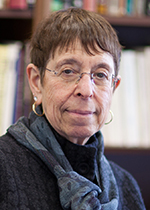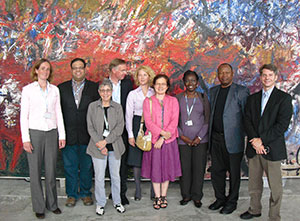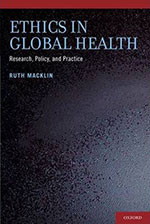

Tackling Ethics
Ruth Macklin: Offering a Global Perspective on Tackling Ethical Questions
Ask yourself this: If quantities of antiretroviral therapy are limited, what subset of the HIV-positive population should receive the drugs? If a government funds a vaccine trial in another country, should that government later be responsible for providing an affordable version of the vaccine to the participating country? If all women should have equal access to family-planning and health services, does this include unmarried minors without parental knowledge or support?
For most people, such questions might offer an interesting topic for discussion among friends or colleagues. But for Dr. Ruth Macklin, these ethical considerations and others like them have shaped a career spanning more than four decades. The professor of epidemiology and population health and Dr. Shoshanah Trachtenberg Frackman Faculty Scholar in Biomedical Ethics is frequently sought as an expert on such issues, particularly when bioethics is at the heart of them.

Ruth Macklin, Ph.D. In 1970, the nascent field of bioethics was foreign to Dr. Macklin, a philosopher by training. Following her graduate work, her long-standing interest in social issues led her to teach classes where philosophy was applied to the issues of the day, such as civil rights and the Vietnam War. This represented a new direction for the field of philosophy and it led a friend, Samuel Gorovitz, to approach her with a new idea - to see if she would be willing to teach “medical ethics” if he was able to win a grant.
As Dr. Macklin recounted, “Sam really had his pulse on what was going on in higher education. When he won the grant from the National Endowment for the Humanities in 1971, the field was so new that we didn’t have any readings for the course, so we had to create them!”
This experience served as Dr. Macklin’s entrée into the field of bioethics and, following stints at Case Western Reserve and the Hastings Center, eventually led her to join the Einstein faculty, working on the fledgling bioethics program where she began to focus on clinical ethics.

Dr. Macklin, in Geneva, Switzerland, with fellow members of a World Health Organization committee that is revising international ethics guidelines. She is third from left. At the College of Medicine, Dr. Macklin has addressed the unique ethical challenges faced at a medical school, such as issues concerning what happens at the bedside and throughout various aspects of the doctor-patient relationship. From the start, working in the Bronx gave her early insight into the challenges faced in clinical ethics.
She recalled, “AIDS came early to the Bronx. Immediately, there were many ethical issues to consider. The first wave of HIV-positive individuals was injection drug users and doctors would refuse to operate on injection drug users for fear of HIV.”
Dr. Macklin embraced this new area of ethics, serving on committees and institutional review boards, teaching classes, and writing. It wasn’t until three different invitations coincided in 1988 that the next big change in Dr. Macklin’s career occurred - a move into the international world of bioethics. The first involved serving as faculty for a two-week seminar in Salzburg, Austria that focused on HIV. “They knew that I had an interest in HIV because of my work in the Bronx and invited me to participate,” she explained.
Soon after, a conference was being planned by the World Health Organization (WHO) and the Council for International Organizations of Medical Sciences, focusing on human values and family planning. “That’s when Samuel Gorovitz called again,” said Dr. Macklin. “Since they were planning the meeting on family planning, they realized it might be a good idea to have a woman give the keynote and Sam suggested it be me. He then called me with the proposition, telling me the topic of the talk. When I responded ‘I don’t know anything about that,’ he simply said, ‘So, you’ll learn.’ And so, I learned.”
That conference was Dr. Macklin’s introduction to Dr. José Barzelatto, whom she met again at another international conference later the same year. Her experience at this third event solidified her role in the world of global health ethics and led to her participation, at Dr. Barzelatto’s request, on a WHO committee focused on reproductive health - the first of many international committees where Dr. Macklin’s expertise has since been requested.

Once Dr. Macklin became established in the field of global bioethics, the offers began to roll in. She has served on various WHO and United Nations committees and advisory groups and as leadership in international ethics associations. She also has taught medical, graduate, and public health students about ethics. And, she developed the NIH Fogarty International Center-funded training program that teaches the fundamentals of bioethics to researchers and clinicians in South America, which just received its fourth competitive renewal – allowing the course to continue through 2016.
She explained, “My Argentine colleague, Florencia Luna, and I applied for a Fogarty International Center grant in 2000, to establish and direct a training program that could enhance capacity building in research ethics among Latin American countries and foster collaborations in the Americas. The course is taught entirely in Spanish and draws participants who are scientists, doctors, lawyers and other professionals. These individuals have taken what they’ve learned about ethics and mentored projects at their home institutions, as well as taught classes and written articles. In some cases, program participants have even made a career switch!”
Recently, a compendium of Dr. Macklin’s work, Ethics in Global Health, was published by Oxford University Press. The book offers a collection of 20 of her published articles on global health issues. It is one of many she has published throughout her career.
When asked what keeps her in bioethics after 40 years, countless publications and almost constant travel, Dr. Macklin cannot disguise her passion. “I find this field to be endlessly fascinating. I was first interested because it brought my academic interests in philosophy together with my social interests, and that still holds true. There is always something new and it continues to appeal to me, whether it involves questions about AIDS, deriving stem cells, or new scientific breakthroughs. It all keeps the neurons firing and the brain working.”
Posted on: Monday, October 15, 2012

Tablet Blog